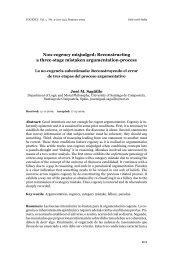Cogency v2 n2
Cogency v2 n2
Cogency v2 n2
Create successful ePaper yourself
Turn your PDF publications into a flip-book with our unique Google optimized e-Paper software.
COGENCY Vol. 2, N0. 2, Spring 2010<br />
a modification on the same plane, not a change of plane.// A sensitive<br />
person who by suggestion becomes courageous hardens himself … [but]<br />
Grace alone can give courage while leaving the sensitivity intact. (ibid.)<br />
But how does Weil know that Grace alone (i.e., divine grace) can give<br />
such “miraculous” courage? We suggest that, in spite of the “surface grammar”<br />
of what she says, she is not to be understood as proposing a causal<br />
explanation of that courage (on the model of, say, “Steroids alone could account<br />
for that athlete’s performance”). Rather, she is explaining what it might<br />
mean to speak of that extraordinary courage her something as “a gift of<br />
God.” In other words we are suggesting Weil’s claim that Grace alone can<br />
give such courage needs to be understood as “a grammatical remark,” rather<br />
than as what it might seem to be–an empirically falsifiable hypothesis. Not<br />
bound by the ordinary logic of “courage” her argument is a persuasion aimed<br />
at extending our concept of courage to include “supernatural (God-given)<br />
courage.” Her argument represents “a grammatical movement” in thought;<br />
it expresses, not “a quasi-physical phenomenon” but “a new way of looking<br />
at things” (Cf. PI §401). 24<br />
Mathematics & Science<br />
Wittgenstein speaks of ‘persuasion’ where what is<br />
put forward has the power to induce one’s interlocutor<br />
to accept a new concept-formation …<br />
(Dilman, p. 17)<br />
1<br />
“Deep” seems an appropriate adjective to characterize disagreements that can<br />
only be resolved through the kind of persuasion Dilman takes Wittgenstein<br />
to be talking about. Resolving such a disagreement will consist, not in getting<br />
one party to reject a false or improbable opinion, but in one party being<br />
persuaded to accept a new concept-formation–i.e., to acknowledge a new<br />
rule about what it does or doesn’t make sense to say and do.<br />
24<br />
The preceding is re-written version of Brenner (2009: 29-30).<br />
68








